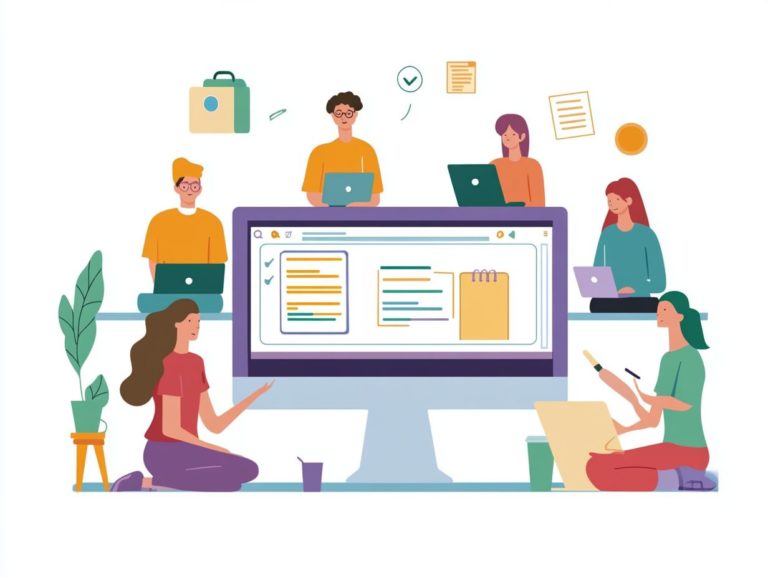Online Bachelor’s Degrees: What Employers Really Think
In today s fast-paced world, online bachelor s degrees are becoming the go-to option for students who value flexibility and convenience in education.
This article explores what online bachelor s degrees involve, the benefits they offer, and how employers view them. It also addresses common myths and misconceptions, providing strategies to make your online degree stand out in a competitive job market.
Whether you re considering an online program or curious about how it might influence your career, this guide offers the insights you need.
Contents
- Key Takeaways:
- Overview of Online Bachelor’s Degrees
- Benefits of an Online Bachelor’s Degree
- Employer Perception of Online Bachelor’s Degrees
- How to Make Your Online Degree Stand Out to Employers
- Common Myths About Online Bachelor’s Degrees
- Frequently Asked Questions
- What is an online bachelor’s degree and why is it becoming more popular?
- Do employers value online bachelor’s degrees as much as traditional degrees?
- What do employers think about the quality of education in online bachelor’s degree programs?
- Are there specific industries that may view online bachelor’s degrees less favorably?
- How can I make my online bachelor’s degree stand out to employers?
- What can I do if an employer is hesitant about my online bachelor’s degree?
Key Takeaways:

- Online bachelor’s degrees offer flexibility and save you money.
- Employers are increasingly positive about online degrees.
- Highlight your skills and network to impress employers.
Overview of Online Bachelor’s Degrees
Online bachelor’s degrees represent a remarkable transformation in higher education, allowing you to pursue your academic aspirations in a flexible learning environment.
As traditional degrees transition online, more accredited institutions are crafting programs designed for adult learners and working professionals, enabling you to balance your education with a full-time career.
This shift towards distance learning enhances the quality of education and reshapes how employers perceive graduates, as online programs gain more credibility in the job market.
Benefits of an Online Bachelor’s Degree
The advantages of earning an online bachelor’s degree are numerous, especially for individuals seeking a flexible schedule that aligns with professional and personal commitments.
Online education allows you to learn at your own pace and access a rich array of resources. This approach supercharges your learning experience and contributes to higher completion rates among adult learners compared to traditional classroom environments.
Flexibility and Convenience
Flexibility and convenience are cornerstones of an online degree, allowing you to tailor your educational journey to fit into your busy life. Classes you can take at your own pace enable you to balance various responsibilities from work to family while advancing your education.
For instance, you can engage in self-paced modules that align with your schedule, whether you prefer studying early in the morning or late at night. Online platforms offer various formats, including video lectures, interactive quizzes, and discussion forums, creating an environment where you can thrive.
The flexibility of these courses enhances information retention and allows you to revisit complex topics whenever necessary, leading to a personalized and effective learning experience.
Cost Savings
Cost savings associated with online degrees often make them more appealing than traditional degrees. You can save significantly on commuting, housing, and materials, contributing to a higher satisfaction level in your educational journey.
A study from the National Center for Education Statistics shows that online learners can save nearly $10,000 per year by choosing virtual classrooms over face-to-face instruction. These savings come from reduced travel and accommodation costs and the flexibility many online programs provide, allowing you to keep your job while studying.
This increased financial freedom typically correlates with heightened satisfaction levels, as you feel less burdened by debt. With employers increasingly recognizing the value of digital learning, the perceived worth of online degrees continues to rise, making them a smart investment in your future.
Employer Perception of Online Bachelor’s Degrees

Employer perception of online bachelor’s degrees has transformed remarkably in recent years. Today, many employers appreciate the value of accredited online programs and the skills acquired in a digital learning environment, including insights on what employers think of online master’s degrees.
Recent hiring statistics indicate that employers consider not only the degree level you ve achieved but also the relevance of the coursework and the credibility of the institution that conferred the degree.
Positive Attitudes and Trends
Recent trends suggest you should pay attention to shifting attitudes among employers towards candidates with online degrees, including specialized programs like online MBA degrees. These credentials are increasingly viewed as legitimate alternatives to traditional degrees.
This evolving perspective stems from the rigorous standards upheld by accredited institutions, recognized as meeting certain educational standards. Such standards ensure graduates possess essential skills and knowledge needed in today s competitive job market.
Employers now increasingly recognize that online MBA programs from regionally accredited universities provide quality education and showcase your ability to manage time effectively and adapt to modern learning environments. These qualities are highly valued in the workforce, especially as many organizations prioritize practical experience and relevant qualifications over conventional educational paths.
Challenges and Misconceptions
Despite the growing acceptance of online education, challenges and misconceptions still linger. Some employers cling to outdated views, questioning the rigor and quality of online degrees compared to traditional classroom experiences.
These perceptions can significantly affect hiring practices, often leading employers to prioritize candidates with conventional educational backgrounds over those holding online credentials. This occurs even when the latter bring relevant skills and experience to the table.
For instance, during recruitment, an employer might dismiss a candidate with an online master’s in business administration, believing it lacks the depth of a degree earned through traditional means. This bias restricts opportunities for skilled professionals and overlooks the increasing number of accredited online programs that offer robust curricula, practical applications, and networking opportunities that can stand toe-to-toe with their on-campus counterparts.
How to Make Your Online Degree Stand Out to Employers
To ensure your online degree captures the attention of employers, it s crucial to showcase the skills you ve acquired throughout your coursework.
Leveraging your professional connections can enhance your appeal in the competitive job market.
Highlighting Skills and Experience
Highlighting the skills you ve honed through an online degree is essential for showcasing your academic and professional readiness to potential employers, particularly in dynamic fields like project management and technical roles.
Employers are increasingly on the lookout for candidates who have relevant knowledge and possess a unique blend of specialized competencies that align with their organizational needs.
- Take project management, for instance mastering software tools like Microsoft Project or Asana can demonstrate your capability to plan and execute projects with precision.
- Don’t forget the power of soft skills. Effective communication, problem-solving, and teamwork are equally vital across various sectors.
- In marketing, your ability to analyze consumer behavior while collaborating with a team can significantly elevate your appeal to prospective employers.
Therefore, articulating both your technical and interpersonal abilities effectively is key to standing out in today s competitive job market.
Showcase your skills today and stand out in the job market! Start networking and enhancing your professional profile now.
Networking and Building Relationships

Networking and building professional connections are essential for graduates holding an online degree. These relationships can profoundly shape your career trajectory and unlock new job opportunities.
In today s digital landscape, your ability to connect with industry professionals can truly distinguish you in a competitive job market. Engaging on platforms like LinkedIn not only allows you to highlight your skills, but also to follow industry leaders, partake in discussions, and join relevant groups that align with your interests.
Attending virtual conferences can pave the way for meaningful interactions. By reaching out to speakers or fellow attendees afterward, you can establish relationships that may blossom into mentorship or even job referrals.
Volunteering for projects can enhance your visibility. These proactive networking strategies can help you build invaluable support systems. Don’t miss out on unexpected career opportunities that you wouldn’t want to miss.
Common Myths About Online Bachelor’s Degrees
Common myths about online bachelor’s degrees can often mislead you regarding their true value.
Some might suggest that these degrees lack rigor or aren t taken seriously by employers. However, the reality is that the higher education landscape is evolving. Reputable institutions now offer accredited (officially recognized) online programs that hold significant merit in the job market.
Debunking Misconceptions
Debunking misconceptions about online degrees is crucial for you, whether you re a prospective student or an employer. These myths often arise from outdated notions about the quality of education compared to traditional classroom experiences.
You might hear that online programs lack the rigor or credibility of conventional degrees, but that perception is becoming increasingly outdated. Many accredited institutions now offer robust online courses that meet the same high educational standards as their in-person counterparts.
Today s employers are progressively recognizing the value of online degrees. They appreciate the skills that come from the ability to work independently, time management, and digital proficiency. These attributes are vital in the modern workforce, making graduates of online programs competitive assets.
As these misconceptions are addressed, it becomes evident that online education can provide a high-quality, flexible pathway to achieving your career goals.
Trends and Predictions
Online education is becoming more accepted by employers, who value the rigorous standards of accredited programs in the continuously evolving landscape of higher education.
This shift is primarily fueled by advancements in technology that pave the way for interactive and immersive learning experiences. Online education is no longer just a viable alternative; it often emerges as the preferred choice for many.
Platforms utilizing the strength of artificial intelligence and machine learning are personalizing your educational journey, while virtual reality provides simulations that closely mirror real-world situations.
As the job market transforms, you ll find that employers are increasingly prioritizing skills over traditional credentials, aligning perfectly with the flexible and accessible nature of online programs.
With the rise of remote work, online education is more important than ever. Prepare for a shift in how employers evaluate your qualifications!
Frequently Asked Questions
What is an online bachelor’s degree and why is it becoming more popular?

An online bachelor’s degree is a four-year undergraduate degree program that can be completed entirely online. It is becoming more popular due to the flexibility and convenience it offers for students who may have work or family obligations.
Do employers value online bachelor’s degrees as much as traditional degrees?
Yes, employers generally view online bachelor’s degrees as equal to traditional degrees when the program is approved. They know that online education requires the same commitment and dedication as traditional education.
What do employers think about the quality of education in online bachelor’s degree programs?
Employers have varying opinions on the quality of online programs. Many recognize that these programs can provide practical skills and real-world experience that are valuable in the workplace, as highlighted in discussions about what employers think about online associate degrees.
Are there specific industries that may view online bachelor’s degrees less favorably?
Some industries, like healthcare and engineering, often prefer traditional degrees. Research your target industry to understand their specific preferences.
How can I make my online bachelor’s degree stand out to employers?
To make your degree shine, highlight any practical experience or internships you completed. Showcase your time management, self-motivation skills, and any relevant certifications you earned.
What can I do if an employer is hesitant about my online bachelor’s degree?
If an employer is hesitant, address their concerns by showing proof of your academic achievements. Offer references or connect them with alumni who have thrived after earning their online degrees.






